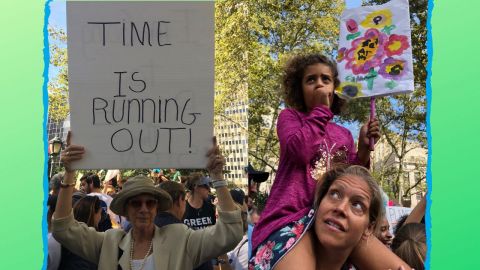The average carbon footprint of a person in the US is 16.5 tons –TONS. So, what can you actually do to decrease this number and make a meaningful difference? Our partners at Hot Mess from PBS Digital Studios find out.
In 1st grade, above the cubbies where we kept our snow boots and mittens, big comic-sans
letters spelled out ‘remember to recycle’ and ‘last one out turns off the light.”
These are the kinds of things recommended by science textbooks, blogs and even the US
Environmental Protection Agency as ways to reduce your personal impact on the climate.
And they’re pretty easy to do.
On average, in the US, turning off the lights when you aren't in the room can save about
a third a kilogram of carbon dioxide per day.
Using a reusable shopping bag every time you go to the store saves 5 kg a year.Drying clothes
on a line instead of in a dryer saves around 200 kg per year.
But compare that to the average carbon footprint of a person in the US: 16 and a half tons
a year–TONS.
So, what can you actually do to make a meaningful difference?
Living car-free keeps 2.4 tons of carbon dioxide out of the atmosphere every year.
But getting rid of your car maybe isn’t feasible.
People in rural or suburban areas have to drive more, but that's a big part of why they
produce double the per capita emissions compared to people in urban areas.
Driving an electric car can save about a ton of carbon dioxide a year, but that still doesn’t
have as much of an impact as just not driving.
That will require big changes in how we live.
Getting rid of your car is technically an individual choice, but it really requires
cultural change.
That isn’t easy.
But we’ve done it before.
I can both vote and wear pants now.
It’s pretty amazing that we’re able to hop on a plane and get anywhere in the world
in a day.
But try turning your next big holiday into a staycation.
You could avoid up to 2.8 tons of carbon emissions by skipping that flight.
But until we invent teleportation, flying is really the only fast way to travel long-distances
to see family and do… business stuff.
There’s really no practical way to fly that doesn’t put hundreds of kilograms carbon
dioxide into the atmosphere.
Globally, raising livestock is on par with transportation when it comes to greenhouse
gases.
But in the US, you and your neighbors are eating almost 20% less beef than you were
15 years ago.
That’s kept 200 million tons of carbon dioxide out of the atmosphere.
And today, 1 in 16 people in the United States say they are vegan or eat plant-based diets.
If you cut meat out of your diet, that’s 800 kilograms of carbon dioxide kept out of
the atmosphere every year.
The choices you make about what you eat are ways to impact the climate every day.
Quick recap.
Get rid of your car - save 2.4 tons, fly less - save up to 2.8 tons per trip, stop eating
meat - probably reduce your emissions by at least a ton.
But here’s a really tough one: If you choose to have one fewer child – that saves on
average 60 tons of carbon dioxide per year.
This is far and away the most effective thing you or I or anyone in the developed world
could do to reduce our emissions.
I’m definitely not going to stand here and tell you not to have children.
Family planning, is a family thing.
And fewer kids is already the trend in most nations.
As a population gets healthier and more educated, birth rates drop as a rule.
These are all huge life changes that don’t always come easy.
There is a lot of culture wrapped up in what we eat, how we get around, and what our families
look like.
Here’s a choice that’s a little simpler: In a lot of places families can choose to
buy green energy that doesn’t contribute to more emissions.
This is surprisingly easy.
For me, all I had to do was log into my account with my energy provider and select the *renewables
box.
Now I get a monthly email telling me how much carbon dioxide I didn’t put in the atmosphere.
Some places this may up your energy bill, but if you’ve got some extra change lying
around I recommend throwing it at solar panels.
From small and easy things like reusing shopping bags and turning out the lights, to those
more challenging high-impact lifestyle choices like what we eat and how we travel, we all
have real power to change our culture and respond to climate change in a meaningful
way.
Solving this it isn’t going to be up to any one of us.
It’ll be up to all of us.

























